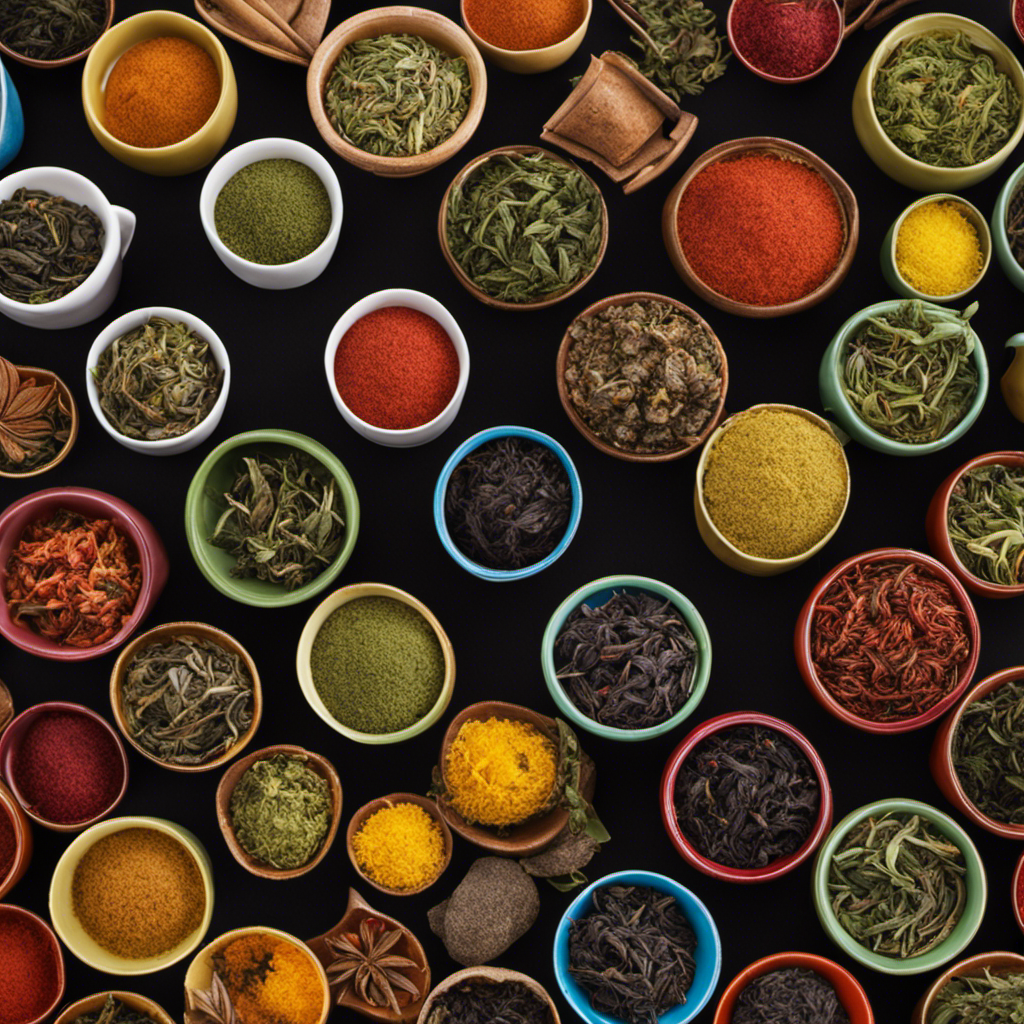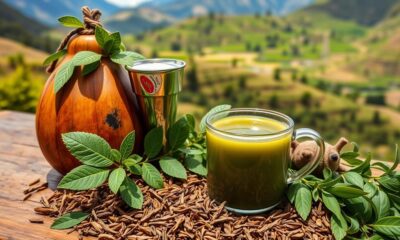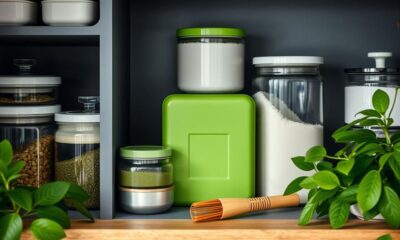Turmeric Tea
How Long Does Ginger Turmeric Tea Last

As someone who loves a good cup of ginger turmeric tea, I know how important it is to make sure it stays fresh and drinkable for as long as possible. The combination of these two powerful spices not only makes for a delicious and satisfying beverage, but also offers numerous health benefits such as reducing inflammation and aiding digestion. However, like any other food or drink item, ginger turmeric tea has a shelf life that can be affected by various factors.
In this article, I will discuss the different factors that can affect the shelf life of ginger turmeric tea, including storage methods, brewing techniques, and additives. I will also answer the burning question: how long does ginger turmeric tea last? Additionally, I will provide tips on how to extend its shelf life and ways to reheat it if needed.
Whether you are a seasoned ginger turmeric tea drinker or just starting out on your journey with this spicy elixir, this article will provide valuable information to ensure that your cuppa remains fresh and enjoyable for as long as possible.
Key Takeaways
- Proper storage and packaging can affect the shelf life of ginger turmeric tea.
- Adding honey or lemon juice and freezing into ice cubes can help extend the shelf life of ginger turmeric tea.
- Reheating can affect the taste and health benefits of ginger turmeric tea.
- Regular consumption of ginger turmeric tea promotes overall health and wellness.
Factors Affecting the Shelf Life
When it comes to the shelf life of ginger turmeric tea, there are a few key factors that come into play. First and foremost, using fresh, high-quality ginger and turmeric will ensure a longer shelf life than using older or lower quality ingredients.
Additionally, brewing time and temperature can also affect how long the tea will last. Longer brewing times or higher temperatures potentially reduce its shelf life.
Finally, proper storage conditions are crucial for maximizing the tea’s longevity. Keeping it in an airtight container away from heat or light can help it stay fresh for as long as possible.
Ingredients Used
To make ginger turmeric tea that lasts, you’ll need fresh ginger root, ground turmeric, honey, lemon juice and black pepper. These ingredients not only give the tea a delicious flavor but also provide numerous health benefits. Ginger has anti-inflammatory properties while turmeric is known for its antioxidant effects. Honey acts as a natural sweetener and adds a soothing effect to the throat while lemon juice gives a refreshing taste to the tea. Black pepper helps in absorption of curcumin which is an active ingredient in turmeric.
It’s important to note that the quality of ingredients used can affect the shelf life of ginger turmeric tea. Using fresh ginger root and ground turmeric ensures that the tea stays flavorful for longer periods of time compared to using dried versions of these spices. Additionally, it’s recommended to store the tea in an airtight container in the fridge for up to 3 days after brewing. Below is a table illustrating how different recipe variations can affect both taste and shelf life:
| Ingredient Variation | Shelf Life | Taste |
|---|---|---|
| Fresh Ginger Root & Ground Turmeric | Up to 3 Days | Strong & Flavorful |
| Dried Ginger Root & Turmeric Powder | Up to 1 Day | Mild & Weaker Flavor |
Moving on from discussing our ingredients list, let’s talk about brew time and temperature for this delightful beverage.
Brewing Time and Temperature
For the perfect cup of ginger turmeric tea, you’ll want to make sure your water is heated just below boiling point and steeped for a short amount of time to allow the flavors to meld together in a deliciously harmonious way.
Here are some brewing techniques that will help you achieve this:
- Heat water to 205°F or just below boiling point.
- Steep for 3-5 minutes.
- Use fresh ginger and turmeric root for maximum flavor.
- Strain before drinking to avoid gritty residue.
- Add honey or lemon to taste.
Aside from its delicious taste, this tea also offers numerous health benefits. Ginger has anti-inflammatory properties that can help relieve pain and reduce inflammation in the body. Turmeric contains curcumin, a powerful antioxidant that may aid in reducing the risk of chronic diseases. By incorporating this tea into your daily routine, you can reap these benefits while indulging in a warm and comforting beverage.
When it comes to storage conditions, it’s important to note that ginger turmeric tea lasts up to three days when stored properly in an airtight container in the refrigerator. However, it’s best enjoyed immediately after brewing for optimal flavor and health benefits.
Storage Conditions
Properly preserving your potable potion involves placing it in an airtight container and putting it into the fridge. The key to extending the shelf life of ginger turmeric tea is proper packaging. An airtight container prevents air, moisture, and bacteria from spoiling the tea’s flavor and aroma. Moreover, storing the tea in the refrigerator slows down oxidation, which is responsible for breaking down nutrients and causing degradation.
Although room temperature storage may be convenient, it shortens the lifespan of ginger turmeric tea. Heat accelerates chemical reactions that can cause spoilage or affect its quality. It’s best to consume freshly brewed ginger turmeric tea immediately or store it in an airtight container in the refrigerator for up to three days. After this period, its taste and potency will start to decline gradually.
In the following section about how long ginger turmeric tea lasts, we’ll delve more into this topic.
How Long Does Ginger Turmeric Tea Last?
You’ll want to drink your ginger turmeric tea within a few days of making it, as the flavors are best when they’re fresh and vibrant. Here are some ways to preserve your tea for as long as possible:
-
Store it in an airtight container: This will prevent air from getting in and causing the tea to go stale.
-
Keep it in the fridge: Cold temperatures help slow down the growth of bacteria that can cause spoilage.
-
Avoid exposure to light: Light can break down some of the compounds in the tea, reducing its flavor and health benefits.
-
Don’t add anything acidic: Lemon or lime juice may be a tasty addition, but they can also shorten the shelf life of your tea.
While following these tips can help extend the life of your ginger turmeric tea, you should still keep an eye out for signs of spoilage such as mold or off odors. It’s always better to err on the side of caution and discard any tea that doesn’t look or smell right.
Signs of Spoilage
I always make sure to keep an eye out for signs of spoilage in my ginger turmeric tea. Changes in color, taste, and smell are the first indicators that something may be off. If the tea has a sour or rancid taste or odor, it’s best to discard it immediately.
Another sign to watch out for is the presence of mold or bacteria, which can grow quickly in warm and humid conditions.
Changes in Color, Taste, and Smell
Interestingly, the color, taste, and smell of ginger turmeric tea can change after only a few days, with one study showing that the antioxidant activity decreased by 60% after just four days of storage. The changes in color are usually due to the effects of oxidation on the tea’s compounds, causing it to turn darker or lose its bright hue. Likewise, the taste and aroma can become weaker or stronger depending on how long it has been sitting in storage.
Brewing techniques also play a role in determining how long ginger turmeric tea lasts. If brewed properly, with water at an appropriate temperature and steeped for just the right amount of time, the tea can last longer than if brewed improperly. However, even with proper brewing techniques, it is still important to monitor any changes in color, taste, or smell as an indicator of when the tea may be going bad due to bacteria or mold growth.
Presence of Mold or Bacteria
The presence of mold or bacteria can significantly affect the quality and safety of your ginger turmeric tea, making it crucial to monitor for any signs of spoilage. Mold growth in tea is often visible as fuzzy patches on the surface while bacterial growth may cause a sour smell or off-taste. When left unchecked, these microorganisms can multiply rapidly and pose health risks.
To prevent contamination, always use clean utensils when preparing your ginger turmeric tea and store it in an airtight container in the refrigerator. Avoid leaving brewed tea at room temperature for extended periods as this can promote bacterial growth.
Regularly check for any signs of mold or discoloration before consuming, and discard if there are any doubts about its safety. By taking these prevention measures, you can ensure that your ginger turmeric tea remains fresh and safe to drink.
In order to extend the shelf life of your ginger turmeric tea even further, there are several tips you can follow. One way is to add honey or lemon juice to act as natural preservatives. Another is to freeze extra portions into ice cubes for easy thawing later on.
With these simple tips, you can enjoy your homemade ginger turmeric tea for longer without worrying about spoilage!
Tips to Extend the Shelf Life
Whenever I make ginger turmeric tea, I always want to make sure it lasts as long as possible. To extend its shelf life, I follow a few simple tips.
First, I store it in an airtight container to keep out any unwanted air and moisture.
Second, I keep the container in the refrigerator to maintain freshness.
And finally, when reheating the tea, I avoid using high heat which can cause spoilage.
By following these tips, my ginger turmeric tea stays fresh for days!
Store in Airtight Containers
To keep your ginger turmeric tea fresh and flavorful for as long as possible, you’ll want to store it in an airtight container that will protect it from moisture and air. Using creative storage ideas can also help prolong its shelf life. The benefits of using airtight containers are numerous: they prevent moisture from getting in, which can cause mold and spoilage; they keep out light, which can degrade the flavor and nutrients of the tea; and they seal in the aroma, so that every cup is just as fragrant as the first.
Here’s a table to give you an idea of how long your ginger turmeric tea might last when stored properly:
| Storage Method | Shelf Life |
|---|---|
| Airtight Container at Room Temperature | 2-3 Days |
| Airtight Container in Refrigerator | 1 Week |
| Airtight Container in Freezer | 6 Months |
Now that you know how long your ginger turmeric tea can last when stored correctly, let’s talk about another step you can take to extend its shelf life even further: keeping it in the refrigerator.
Keep in the Refrigerator
Keep your ginger turmeric tea fresh and flavorful for an extended period by storing it in the refrigerator. Storing tea in the fridge is a great way to extend its shelf life since cooler temperatures slow down bacterial growth that can cause spoilage.
Make sure you transfer your tea into an airtight container before putting it in the fridge to prevent any absorption of unwanted odors or flavors from other foods. It’s important to keep in mind that even though refrigeration can help preserve ginger turmeric tea, it won’t last forever.
The shelf life of homemade tea typically ranges between 3-5 days when stored properly at a temperature of around 40°F or below. So, make sure you consume your brewed ginger turmeric tea within this time frame to enjoy its full flavor potential.
Now let’s move on to another crucial aspect of maintaining the freshness of your ginger turmeric tea – avoiding reheating.
Avoid Reheating
I hope you found the previous subtopic informative on how to store ginger turmeric tea in the refrigerator. However, it’s essential to keep in mind that reheating ginger turmeric tea can affect its taste and health benefits. Therefore, it’s best to avoid reheating whenever possible.
There are several ways to avoid reheating your ginger turmeric tea. One of the easiest ways is to make small batches of tea that you can finish within a day or two. If you have leftover tea, consider using it as a base for smoothies or other beverages instead of reheating it.
You could also try making iced ginger turmeric tea by brewing a strong batch and pouring it over ice cubes with some lemon or honey for added flavor. Alternatively, if you’re looking for a hot beverage substitute, try herbal teas like chamomile or mint that offer similar health benefits without the risk of altering their taste upon reheating.
Now that we’ve covered some substitutes for ginger turmeric tea and ways to avoid reheating it, let’s move on to the next section: How to reheat ginger turmeric tea?
How to Reheat Ginger Turmeric Tea?
So you’ve made a batch of delicious ginger turmeric tea, but now you’re wondering how to reheat it. Well, there are three main methods I use: the microwave method, stove top method, and electric kettle method.
Each method has its own benefits and drawbacks, so let’s dive into each one in more detail.
Microwave Method
Zap your zesty zingy ginger turmeric tea in the microwave for a quick and convenient way to enjoy its benefits. Here’s how:
- Pour your refrigerated ginger turmeric tea in a microwave-safe container.
- Heat it on high for 1-2 minutes, or until it reaches your desired temperature.
- Carefully remove the container from the microwave and stir to distribute heat evenly.
- Sip slowly and savor the warm, soothing flavors of this healthy brew.
While there are alternative methods to reheating ginger turmeric tea, such as using a stove top or electric kettle, microwaving is by far the easiest option if you’re short on time. Plus, studies have shown that heating ginger can actually increase its anti-inflammatory properties! So go ahead and pop your mug in the microwave for a health-boosting pick-me-up.
Moving on to our next method – let’s explore how to reheat ginger turmeric tea using the stove top.
Stove Top Method
To reheat your ginger turmeric tea on the stove top, simply pour it into a pot and heat it over medium heat while stirring occasionally until it’s steaming hot. Keep an eye on the tea to make sure it doesn’t boil over or burn.
You may notice some color variations in your tea when reheating on the stove top, but this is normal and doesn’t affect the flavor. Experimenting with different flavor combinations can be fun when making ginger turmeric tea. You can add honey or lemon for a sweeter taste, or black pepper for a spicy kick.
Once your tea is fully heated on the stove top, you’re ready to enjoy! If you don’t have access to a stove, don’t worry – there’s another method you can use: the electric kettle method.
Electric Kettle Method
Using an electric kettle is a quick and convenient way to heat up your delicious ginger turmeric tea, giving you a warm and comforting sensation with each sip. Electric kettles are designed to boil water faster than traditional stove-top methods, which makes them perfect for busy individuals who need their hot beverages in a hurry. Not only are electric kettles fast and efficient, but they also come with built-in safety features that make them safer to use than stove-tops.
Here’s a table that highlights some of the benefits of using an electric kettle over traditional stove-top methods:
| Benefits | Electric Kettle | Stove-Top |
|---|---|---|
| Speed | Boils water in under 2 minutes | Takes several minutes to boil water |
| Safety | Automatic shut-off when water boils or kettle is empty | No automatic shut-off feature |
| Convenience | Can be easily moved around the kitchen | Limited mobility because it needs to be used on the stove-top |
Now that we know how using an electric kettle can benefit our ginger turmeric tea-making process, let’s explore ways to make our tea last longer without compromising its flavor.
How to Make Ginger Turmeric Tea Last Longer?
So, to recap the key points on how to make ginger turmeric tea last longer:
- First of all, store it properly in an airtight container in the refrigerator.
- Secondly, avoid adding any dairy or sweeteners until you’re ready to drink it.
- And thirdly, consider making a larger batch and freezing it for later use.
In my experience, following these tips can help preserve the freshness and potency of your ginger turmeric tea for several days or even weeks.
Ginger turmeric tea isn’t only delicious but also packed with health benefits. By taking some simple steps to make it last longer, you can enjoy this flavorful beverage whenever you want without having to worry about it going bad too quickly. So go ahead and experiment with different recipes and brewing methods until you find the perfect blend that suits your taste buds!
Recap of Key Points
Hey, did you catch all the important details about ginger turmeric tea’s shelf life that we discussed earlier? As a quick recap, we talked about the various factors that affect how long this tea lasts, including its ingredients and storage conditions. We also shared some helpful tips on how to extend its shelf life, such as using airtight containers and refrigerating it immediately after brewing.
To help visualize these points better, here is a table summarizing the key takeaways from our previous discussion:
| Shelf Life Factors | Storage Tips | Reheating Methods |
|---|---|---|
| Ingredients (fresh vs. dried) | Use airtight containers | Heat in microwave or stovetop |
| Brewing time and temperature | Refrigerate immediately after brewing | Avoid overheating to prevent bitterness |
| Exposure to air and light | Keep away from moisture and odors |
By following these simple guidelines, you can ensure that your ginger turmeric tea stays fresh for longer periods. Whether you prefer drinking it hot or cold, reheating it properly will also maintain its taste and potency. With these tips in mind, let’s move on to some final thoughts on this delicious beverage!
Final Thoughts
As we wrap up our discussion on ginger turmeric tea, let’s explore some final thoughts about this flavorful and healthy beverage.
Drinking ginger turmeric tea regularly can have numerous health benefits. The anti-inflammatory properties of both ginger and turmeric help to reduce inflammation in the body, which can alleviate joint pain and improve digestion. Ginger also has a natural ability to boost the immune system, making it a great option for preventing illnesses like colds and flu.
There are many different ways to enjoy ginger turmeric tea. You can add honey or lemon for flavor, or even mix it with other herbs like mint or chamomile for added benefits. Some people prefer to drink it hot while others enjoy it cold over ice. No matter how you choose to consume it, incorporating ginger turmeric tea into your daily routine is an easy way to promote overall health and wellness.
Moving forward, there are additional resources available online that can provide more information about the benefits of drinking ginger turmeric tea regularly.
Additional Resources
You probably don’t need any additional resources to answer this question because, let’s face it, ginger turmeric tea doesn’t usually last very long once you start sipping on its deliciousness. However, if for some reason you do have leftover tea that you want to keep for later use, there are a few things to keep in mind.
First and foremost, it’s important to store the tea properly. You can refrigerate it for up to 5 days but make sure it’s stored in an airtight container or bottle. Additionally, reheating the tea may affect the flavor and nutritional benefits of the ingredients so it’s best to drink it cold or at room temperature. That being said, enjoy your ginger turmeric tea fresh and reap all the amazing benefits!
| Benefits of Ginger Turmeric Tea | Different Recipes for Ginger Turmeric Tea |
|---|---|
| Anti-inflammatory properties | Classic ginger turmeric tea with honey |
| Boosts immune system | Coconut milk and ginger turmeric latte |
| Helps with digestion | Ginger turmeric lemonade |
| Reduces inflammation-related pain | Golden milk with ginger turmeric paste |
Frequently Asked Questions
Can I freeze ginger turmeric tea to extend its shelf life?
Yes, freezing ginger turmeric tea can extend its shelf life by several months. However, it’s important to note that the texture and flavor may change slightly once thawed. Store the tea in an airtight container before placing it in the freezer for best results.
Is it safe to consume ginger turmeric tea after its expiration date?
I wouldn’t recommend consuming ginger turmeric tea after its expiration date, even if you’ve extended its shelf life by freezing it. Safety is important, so it’s best to make a fresh batch when needed.
Can I add milk or sweeteners to ginger turmeric tea before storing it?
Yes, you can add milk or sweeteners to ginger turmeric tea before storing it. It’s all about personal flavor preferences. However, keep in mind that adding dairy may decrease the tea’s shelf life.
Can I store ginger turmeric tea in a plastic container instead of a glass jar?
Storing ginger turmeric tea in a plastic container is possible, but I prefer using glass jars. Plastic may affect the aroma preservation of the tea. I suggest keeping it in a cool and dark place to extend its shelf life.
Can I make a large batch of ginger turmeric tea and store it for a week?
I can make a large batch of ginger turmeric tea and store it for up to a week. I prefer using glass jars over plastic containers as it preserves the taste longer. Proper storage methods ensure freshness, aroma, and health benefits.
Conclusion
In conclusion, ginger turmeric tea is a delicious and healthy way to boost your immune system and improve digestion. However, its shelf life can be affected by various factors such as storage conditions, ingredients used, and preparation methods. It’s important to consume the tea within a reasonable time frame to avoid spoilage and potential health risks.
For instance, my friend Sarah made a big batch of ginger turmeric tea for her family but forgot to store it in the refrigerator overnight. The next day, she noticed that the tea had a sour smell and tasted bitter. She had to discard the entire batch, which was a waste of time and resources.
To prevent such incidents from happening, it’s advisable to follow proper storage guidelines such as using an airtight container, refrigerating the tea promptly after brewing, and consuming it within 2-3 days. Additionally, adding natural preservatives like lemon or honey can help extend the shelf life of ginger turmeric tea.
Overall, with proper care and attention, you can enjoy fresh and flavorful ginger turmeric tea for several days while reaping its numerous health benefits. So go ahead and brew yourself a cup today!
In the vast and diverse world of coffee, coffee alternatives, and tea, Olivia has found her calling. As an author and a dedicated coffee and tea aficionado, her work for Cappuccino Oracle reflects her profound love and understanding of the intricate complexities found within these beverages. Olivia’s passion for the subject serves as both a catalyst for her creativity and a connection point with her audience.
Olivia’s appreciation for coffee, coffee alternatives, and tea blossomed at an early age. She discovered that these beverages invigorated her senses and stimulated her creative spirit. From the nuanced flavors of single-origin roasts to the captivating narratives intertwined with coffee, coffee alternatives, and tea trade and culture, Olivia found an unlimited source of inspiration in her daily cup.
Her love for these beverages and her talent for storytelling eventually converged at Cappuccino Oracle. As an author, Olivia’s mission is to illuminate the intricate tapestry that makes up the world of coffee, coffee alternatives, and tea. Her articles span a diverse range of topics, encompassing everything from the unique flavors of different brews to the sociocultural history intertwined with their cultivation and consumption.
Turmeric Tea
What Does Kombucha Tea Do to Your Body

Curious about the effects of kombucha tea on your body? Allow me to shed some light on the topic.
This ancient fermented drink has gained popularity in recent years for its potential health benefits. From improving digestion and gut health to boosting the immune system and aiding in detoxification, kombucha tea offers a range of positive effects.
However, it’s important to be aware of potential side effects and take necessary precautions.
So, let’s dive in and explore the wonders of kombucha tea!
Key Takeaways
- Kombucha tea promotes healthy digestion and gut health by aiding in nutrient absorption, breaking down food, and restoring beneficial bacteria in the gut.
- It supports the immune system through the presence of beneficial bacteria, probiotics, antioxidants, polyphenols, and vitamins and minerals.
- Kombucha tea has detoxification properties that help neutralize free radicals, eliminate toxins, improve liver function, and promote a healthy gut microbiome.
- It is important to be aware of potential side effects and precautions, such as possible allergic reactions, contamination risks, and starting with small amounts to minimize side effects. It is also advisable to consult with a healthcare provider if you have a weakened immune system or underlying health conditions.
Health Benefits of Kombucha Tea
You’ll be pleased to know that drinking kombucha tea can provide you with numerous health benefits.
One of the most notable benefits is its potential for weight loss. Kombucha tea is low in calories and can help to suppress appetite, making it a great addition to a weight loss regimen. Additionally, kombucha tea contains acetic acid, which has been found to increase metabolism and fat burning. It also aids in digestion, promoting a healthy gut, which is essential for maintaining a healthy weight.
Another benefit of kombucha tea is its impact on skin health. The tea is rich in antioxidants, which help to protect the skin from damage caused by free radicals. It also contains probiotics, which can improve skin conditions such as acne and eczema.
Effect on Digestion and Gut Health
The fermentation in kombucha can promote healthier digestion and gut health. Kombucha is rich in digestive enzymes, which help break down food and enhance nutrient absorption. Additionally, it contains probiotic bacteria that can restore the balance of beneficial bacteria in the gut, supporting a healthy digestive system.
Kombucha can alleviate digestive issues such as bloating and gas, providing relief and improving overall comfort. The probiotics in kombucha can strengthen the intestinal barrier, reducing the risk of leaky gut syndrome and enhancing gut health. By promoting the growth of beneficial bacteria in the gut, kombucha can support a healthy microbiome and improve digestion.
These effects on digestion and gut health are crucial for maintaining overall wellness. Furthermore, the impact of kombucha on the immune system is worth exploring.
Impact on Immune System
Boosting your immune system is essential for maintaining overall health and well-being. One way to strengthen your defenses is by incorporating kombucha tea into your diet. Kombucha is a fermented tea that contains beneficial bacteria and antioxidants, which can support your immune system. Studies have shown that the probiotics found in kombucha can help improve gut health and enhance the body’s ability to fight off infections. Additionally, the antioxidants in kombucha can help reduce inflammation and oxidative stress, further supporting immune function. To emphasize the benefits of kombucha for immunity, here is a table showcasing some key components and their effects:
| Component | Effect on Immune System |
|---|---|
| Probiotics | Enhances immune response |
| Antioxidants | Reduces inflammation |
| Polyphenols | Boosts immune function |
| Vitamins and Minerals | Supports overall health |
Incorporating kombucha tea into your daily routine can be a simple and delicious way to boost your immunity and strengthen your body’s defenses.
Detoxification Properties of Kombucha Tea
Incorporating kombucha into your routine can help detoxify and cleanse your system. This fermented tea contains beneficial compounds that support the detoxification process and promote liver health. Here are three reasons why kombucha is a great addition to your detox regimen:
-
Kombucha contains antioxidants that help neutralize harmful free radicals in the body, reducing oxidative stress and supporting the natural detoxification process.
-
The organic acids present in kombucha, such as acetic acid and glucuronic acid, aid in the elimination of toxins and improve liver function.
-
Kombucha is rich in probiotics, which promote a healthy gut microbiome. A balanced gut microbiome is crucial for optimal detoxification and overall well-being.
By incorporating kombucha into your routine, you can enhance your body’s natural detoxification process and promote liver health.
However, it is important to be aware of potential side effects and take necessary precautions.
Potential Side Effects and Precautions
While kombucha can offer numerous health benefits, it’s important to be aware of potential side effects and take necessary precautions.
Although considered generally safe for most people, there are potential risks associated with consuming kombucha tea. One of the main concerns is the possibility of allergic reactions. Some individuals may be sensitive to certain components in kombucha, such as yeast or bacteria, and may experience symptoms like hives, itching, or difficulty breathing.
It’s also worth noting that homemade kombucha may carry a higher risk of contamination, leading to adverse effects. To minimize the chances of experiencing side effects, it is recommended to start with small amounts of kombucha and gradually increase the intake.
Additionally, individuals with weakened immune systems or underlying health conditions should consult with their healthcare provider before consuming kombucha.
Frequently Asked Questions
Can Kombucha Tea Help With Weight Loss?
I’ve found that kombucha tea can be helpful for weight loss. It can boost metabolism and aid in appetite control. However, it’s important to note that it should be consumed as part of a balanced diet and exercise routine.
How Often Should I Drink Kombucha Tea to Experience Its Health Benefits?
To experience the health benefits of kombucha tea, I drink it regularly. It’s important to find a balance and not overdo it. I’ve found that drinking it a few times a week works well for me.
Can Kombucha Tea Cure or Prevent Cancer?
Can kombucha tea really cure or prevent cancer? While there are no scientific studies to support this claim, kombucha tea has been known to support the immune system and improve digestive health.
Is It Safe to Consume Kombucha Tea During Pregnancy?
During pregnancy, it is important to consider the potential risks and side effects of consuming kombucha tea. It is best to consult with a healthcare professional to determine if it is safe for breastfeeding mothers.
Does Kombucha Tea Have Any Effect on Mental Health or Anxiety?
Kombucha tea can have a positive effect on mood and help reduce stress. It contains B vitamins and probiotics, which support a healthy gut-brain connection. Regular consumption may contribute to improved mental well-being.
Conclusion
In conclusion, it’s safe to say that indulging in a glass of kombucha tea every now and then can work wonders for your body.
From promoting healthy digestion and gut health to boosting your immune system, this fizzy elixir is a true gem.
Not to mention its detoxifying properties, which gently cleanse your body from within.
However, as with anything, it’s important to exercise caution and moderation.
So go ahead and enjoy the delightful benefits of kombucha tea, but remember to sip responsibly.
Noah, the Editor-in-Chief at Cappuccino Oracle, plays a pivotal role in shaping the voice and vision of our renowned platform. With an unwavering passion for coffee, coffee alternatives, and tea, Noah leads Cappuccino Oracle towards new horizons in the realm of coffee journalism.
Beyond his professional responsibilities, Noah serves as a mentor and guiding force for his team. His dedication to journalistic excellence and genuine love for coffee, coffee alternatives, and tea continue to inspire and motivate the Cappuccino Oracle family. In the ever-evolving world of these beverages, Noah’s leadership ensures that our platform remains at the forefront, delivering enlightening and enjoyable content to our readers worldwide.
Turmeric Tea
Where Did Kombucha Scoby Tea Originate

I have always been fascinated by the origins of kombucha scoby tea. As I explored its history, I unearthed a captivating journey that has unfolded over centuries and across continents.
This ancient drink, known for its probiotic properties and unique flavor, has a rich cultural significance and a deep-rooted tradition.
In this article, we will explore the historical significance, cultural roots, and traditional brewing methods of kombucha scoby tea.
So, let’s dive in and uncover the truth behind where this beloved beverage truly originated.
Key Takeaways
- Kombucha scoby tea originated in China over 2,000 years ago during the Qin Dynasty.
- It was consumed for its medicinal properties and believed to have detoxifying effects and digestive benefits.
- Kombucha has been part of different cultures’ traditions for thousands of years.
- Brewing and consuming kombucha has brought communities together and fostered a sense of connection.
The Ancient Origins of Kombucha Scoby Tea
You might be curious to know that the ancient origins of kombucha scoby tea can be traced back to China over 2,000 years ago. Kombucha, also known as ‘the tea of immortality,’ has a rich history and a reputation for its health benefits.
The origins of kombucha can be attributed to the Qin Dynasty, where it was consumed for its medicinal properties. Traditional Chinese medicine believed that kombucha had detoxifying effects and could improve digestion and overall well-being.
The unique fermentation process used to create kombucha involves a symbiotic culture of bacteria and yeast (SCOBY), which creates a fizzy, tangy, and slightly sweet beverage. This ancient elixir has been passed down through generations, transcending time and cultures, and continues to be enjoyed today for its various health benefits.
Now, let’s delve into the historical significance of kombucha scoby tea.
Historical Significance of Kombucha Scoby Tea
The historical significance of this fermented drink can be traced back to its ancient origins. Kombucha scoby tea has a rich history that spans centuries and cultures. Here are three reasons why this drink holds such importance:
-
Tradition: Kombucha has been consumed for thousands of years, with its origins believed to be in China or Russia. It has been passed down through generations, becoming a beloved part of different cultures’ traditions.
-
Health Benefits: Kombucha is known for its potential health benefits. It is rich in probiotics, which can promote gut health and digestion. It also contains antioxidants, which can help protect against oxidative stress and inflammation.
-
Community: Kombucha brewing has brought communities together for centuries. It has been shared among friends and family, fostering a sense of connection and camaraderie.
Understanding the historical origins and health benefits of kombucha scoby tea allows us to appreciate its significance in our lives today.
Cultural Roots of Kombucha Scoby Tea
Believed to have its roots in China or Russia, kombucha scoby tea has been a part of different cultures’ traditions for thousands of years. This ancient beverage has been influenced by various cultural practices, each adding their unique twist to the brewing process.
In China, kombucha is known as ‘chájūn’ and is believed to have been consumed for its health benefits. In Russia, it is called ‘chaynyy grib’ and is often associated with folklore and traditional medicine. These cultural influences have shaped the way kombucha is brewed and consumed today.
Kombucha scoby tea is celebrated for its numerous health benefits, including probiotics, antioxidants, and detoxification properties. It is believed to support digestion, boost the immune system, and improve overall gut health.
With its rich cultural heritage and health-promoting properties, kombucha scoby tea continues to be enjoyed by people worldwide.
Kombucha Scoby Tea’s Journey Across Continents
Traveling across continents, kombucha scoby tea found its way into different cultures and was embraced for its unique flavors and health benefits. People from all walks of life have come to appreciate the numerous benefits that this fermented tea offers. Here are three reasons why kombucha scoby tea has gained such popularity today:
Improved Digestion: Kombucha scoby tea contains probiotics, which promote a healthy gut by improving digestion and aiding in nutrient absorption. This can lead to reduced bloating, increased energy levels, and a strengthened immune system.
Detoxification: The tea is rich in antioxidants that help eliminate toxins from the body, supporting liver health and boosting overall detoxification processes.
Mental Well-being: Kombucha scoby tea is known to have a positive impact on mental health. Its B vitamins and amino acids can help reduce stress, improve mood, and enhance cognitive function.
Given its wide range of health benefits, it’s no wonder that kombucha scoby tea has become a popular beverage choice today. Transitioning into the next section, let’s explore the traditional brewing methods of this remarkable tea.
Traditional Brewing Methods of Kombucha Scoby Tea
To brew kombucha scoby tea traditionally, you’ll need a few basic ingredients like black or green tea, sugar, and a scoby. The traditional methods of brewing kombucha scoby tea involve a fermentation process that has been passed down for generations.
First, I start by boiling water and steeping the tea leaves for about 10 minutes. Then, I add sugar to the hot tea and stir until it dissolves completely. After the tea has cooled to room temperature, I transfer it to a glass jar and place the scoby on top. The scoby acts as a culture that will feed on the sugar and convert the tea into a tangy and fizzy beverage.
I cover the jar with a cloth and let it sit undisturbed for about a week, allowing the fermentation process to take place. During this time, the scoby consumes the sugar, producing carbon dioxide and various acids that give kombucha its unique taste.
Once the desired flavor is achieved, I strain the tea and store it in the refrigerator for a refreshing and healthy drink.
Frequently Asked Questions
What Are the Health Benefits of Drinking Kombucha Scoby Tea?
Drinking kombucha scoby tea has numerous health benefits. It boosts digestion, strengthens the immune system, detoxifies the body, and improves gut health. The brewing process involves fermenting sweet tea with a scoby, resulting in a probiotic-rich beverage.
What Are the Different Flavors of Kombucha Scoby Tea Available?
There are many flavored variations of kombucha scoby tea available, each with its own unique taste. Brewing techniques can vary, but the common goal is to ferment the tea with a symbiotic culture of bacteria and yeast (SCOBY) to create a tangy and fizzy beverage.
How Long Does It Take to Brew Kombucha Scoby Tea?
Brewing time for kombucha scoby tea varies, but it usually takes around 7-14 days. Temperature control is important during fermentation to ensure proper growth of the scoby and the desired flavor profile.
Can Kombucha Scoby Tea Be Made at Home?
Sure, you can make kombucha scoby tea at home. It’s easy and has many benefits. You’ll need a scoby, tea, sugar, and patience. Homemade kombucha scoby tea is delicious, probiotic-rich, and a great way to support gut health.
Is Kombucha Scoby Tea Suitable for People With Dietary Restrictions, Such as Vegans or Those With Gluten Intolerance?
Yes, kombucha scoby tea is suitable for people with dietary restrictions. There are vegan alternatives available and it is naturally gluten-free. It’s a great option for those looking for a healthy and flavorful beverage.
Conclusion
In conclusion, learning about the ancient origins and cultural significance of Kombucha Scoby Tea has been truly fascinating. It is incredible to think that this elixir has traveled across continents, leaving its mark on various cultures throughout history.
Just like the Scoby itself, Kombucha has a way of connecting people, bridging gaps, and fostering a sense of community. It is a reminder that even in a diverse world, we can find common ground and create something beautiful together.
So, let’s raise a glass of this delightful beverage and toast to the power of unity and the magic of Kombucha Scoby Tea. Cheers!
Justin is a seasoned author, coffee and tea enthusiast, and an essential member of the Cappuccino Oracle team. With a keen appreciation for the complexities of coffee, coffee alternatives, and tea, Justin has dedicated his professional career to exploring these realms and sharing his insights with readers worldwide.
Justin’s immersion in the world of coffee, coffee alternatives, and tea began at a young age, kindling a passion that extended beyond mere consumption. This love for these beverages led him to combine his talent for writing with his devotion to coffee and tea, bringing him to Cappuccino Oracle as a dedicated author.
Turmeric Tea
Which Tea for Kombucha

So you’re interested in making kombucha, huh? Well, you’re in luck! In this article, I will discuss the top teas to use for brewing this delicious fermented drink.
From the benefits of green tea to the unique choices of oolong and white tea, we’ll explore it all.
So sit back, grab a cuppa, and let’s dive into the wonderful world of kombucha brewing. Trust me, you won’t want to miss this!
Key Takeaways
- Green tea is rich in antioxidants and contains catechins with antimicrobial properties, making it a beneficial choice for kombucha.
- Black tea, with its higher caffeine content, stimulates the SCOBY and results in tangy and slightly effervescent kombucha.
- Herbal teas offer unique flavors and aromas, aid digestion, boost immunity, and promote overall well-being when used in kombucha.
- Oolong and white teas add complex flavors, with oolong tea providing weight loss promotion and improved heart health, while white tea boosts the immune system and promotes healthy skin.
Benefits of Green Tea for Kombucha
Green tea is known for its numerous health benefits, making it a popular choice for making kombucha. When it comes to kombucha, green tea offers a range of advantages that make it an ideal base for fermentation.
Firstly, green tea is rich in antioxidants, which help to protect the body against free radicals and reduce the risk of chronic diseases. Additionally, green tea contains compounds like catechins, which have antimicrobial properties that can support the growth of beneficial bacteria during the fermentation process.
When choosing the best green tea brand for kombucha, it is important to look for high-quality loose leaf tea that is organic and free from additives. This ensures that you are getting the maximum health benefits and flavor for your kombucha.
Now, let’s explore the different black tea varieties that can also be used for brewing kombucha.
Exploring Black Tea Varieties for Kombucha
You’ll find that Assam and Ceylon are two popular black tea varieties for making kombucha. These teas provide a robust flavor profile that complements the fermentation process.
When exploring different fermentation methods for kombucha, it’s important to consider the role of caffeine. Black tea contains a higher caffeine content compared to other tea varieties, which can influence the fermentation process. The caffeine acts as a stimulant for the SCOBY (symbiotic culture of bacteria and yeast), helping it to metabolize sugars and produce organic acids. This results in a tangy and slightly effervescent kombucha. Additionally, the caffeine in black tea can provide a natural energy boost when consumed.
Transitioning into the subsequent section about herbal tea options for kombucha brewing, let’s now explore the caffeine-free alternatives for those looking to enjoy kombucha without the stimulating effects of caffeine.
Herbal Tea Options for Kombucha Brewing
When brewing kombucha, it’s worth considering the variety of caffeine-free herbal teas available as an alternative to black tea. Not only do herbal teas offer unique flavors and aromas, but they also bring a range of health benefits to your homemade kombucha.
Herbal teas are known for their calming properties, aiding digestion, boosting immunity, and promoting overall well-being. Some of the best herbal tea blends for kombucha include chamomile, which adds a soothing floral note, and hibiscus, which lends a vibrant and tangy flavor. Other popular options are peppermint, with its refreshing taste, and lavender, which adds a delicate floral touch.
These herbal teas can elevate your kombucha experience and provide a delightful twist to your brew.
Now, let’s explore another unique choice for kombucha: oolong tea.
Oolong Tea: A Unique Choice for Kombucha
Oolong tea has a distinct flavor profile that adds a unique twist to your homemade kombucha. It is a semi-oxidized tea that falls between green and black tea in terms of oxidation level. This results in a complex flavor that is both floral and fruity, with a hint of earthiness.
Oolong tea benefits include promoting weight loss, boosting metabolism, and improving heart health. Its rich flavor profiles make it a versatile choice for kombucha brewing. Here are three reasons why you should consider using oolong tea for your kombucha:
- Oolong tea adds a depth of flavor that enhances the overall taste of your kombucha.
- Its floral and fruity notes create a refreshing and aromatic brew.
- The unique combination of antioxidants in oolong tea promotes general well-being and adds health benefits to your fermented drink.
Incorporating oolong tea into your kombucha recipe will not only make it more interesting but also provide you with the benefits of this unique and flavorful tea.
White Tea: An Unexpected Twist for Kombucha
White tea adds a delicate and subtle flavor profile that brings a surprising twist to your homemade kombucha. Not only does it enhance the taste, but white tea also offers numerous health benefits.
Known for its high antioxidant content, white tea helps boost your immune system and fight off free radicals. It is also believed to promote healthy skin and support weight loss.
When choosing white tea for your kombucha, it is important to opt for high-quality brands that prioritize organic and sustainable farming practices. Some of the best white tea brands include Silver Needle, White Peony, and Longevity Eyebrow. These brands ensure that you are getting the finest leaves that will infuse your kombucha with a delightful flavor and maximize the health benefits.
Frequently Asked Questions
How Long Does It Take for Kombucha to Ferment Using Different Types of Tea?
It depends on the type of tea used for kombucha fermentation. Some tea varieties, like black tea, ferment faster, taking around 7-10 days. Green tea and white tea may take longer, around 10-14 days.
Can I Use Flavored Teas to Make Kombucha?
Yes, you can use flavored teas to make kombucha. However, it’s best to stick with traditional teas like green tea for kombucha brewing. Herbal teas may not provide the necessary nutrients for fermentation.
What Factors Should I Consider When Choosing the Right Tea for Kombucha?
When choosing tea for kombucha, factors to consider are the type of tea (green, black, or oolong), caffeine content, and flavor profile. Different types of tea may require varying fermentation times.
Are There Any Teas That Should Be Avoided When Making Kombucha?
There are some teas that should be avoided when making kombucha. They can impact the fermentation time and affect the taste. It’s important to choose the right tea to ensure a successful brew.
Can I Blend Different Types of Tea Together to Make Kombucha?
Yes, you can blend different types of tea together to make kombucha. It’s a great way to experiment with flavors and create unique taste profiles. Just make sure to choose teas that are suitable for kombucha fermentation.
Conclusion
In conclusion, choosing the right tea for your kombucha is crucial in achieving the perfect balance of flavors and health benefits.
Green tea offers a refreshing and antioxidant-rich base, while black tea varieties add depth and complexity.
Herbal teas provide a wide range of flavors and can be a great option for those looking to experiment.
Oolong tea brings a unique twist with its semi-fermented leaves, and white tea provides a surprising touch of delicacy.
Remember, the choice of tea is like the key ingredient in a symphony, harmonizing all the flavors together.
So, grab your kettle and start brewing your own kombucha masterpiece!
Justin is a seasoned author, coffee and tea enthusiast, and an essential member of the Cappuccino Oracle team. With a keen appreciation for the complexities of coffee, coffee alternatives, and tea, Justin has dedicated his professional career to exploring these realms and sharing his insights with readers worldwide.
Justin’s immersion in the world of coffee, coffee alternatives, and tea began at a young age, kindling a passion that extended beyond mere consumption. This love for these beverages led him to combine his talent for writing with his devotion to coffee and tea, bringing him to Cappuccino Oracle as a dedicated author.
-

 Coffee Basics3 weeks ago
Coffee Basics3 weeks ago10 Potential Health Risks of Single-Serve Coffee Pods and How to Mitigate Them
-

 Coffee Basics3 weeks ago
Coffee Basics3 weeks agoCaffeine Content Comparison: Nespresso Vs. Traditional Coffee Vs. Energy Drinks
-

 Coffee Basics2 weeks ago
Coffee Basics2 weeks agoYerba Mate: The South American Superfood and Its Health Benefits
-

 Coffee Basics2 weeks ago
Coffee Basics2 weeks agoThe Impact of Coffee on Digestive Health: What Science Says
-

 Coffee Basics3 weeks ago
Coffee Basics3 weeks agoCelebrity Coffee Habits: Insights From TV and Movie Stars
-

 Coffee Basics3 weeks ago
Coffee Basics3 weeks agoSoft Drinks and Medical Tests: What You Need to Know
-

 Coffee Basics2 weeks ago
Coffee Basics2 weeks agoHerbal Teas for Every Occasion: From Relaxation to Romance
-

 Coffee Basics3 weeks ago
Coffee Basics3 weeks agoMaximizing the Shelf Life of Your Matcha: Storage Tips and Tricks
































